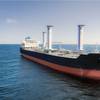Los Angeles Joins 'Conversation' on New Maritime Strategy
By Lt. Ed Early, Navy Office of Information West Public Affairs
The Navy's latest "Conversation with the Country" brought its discussion of the new national maritime strategy to an appropriate venue – Los Angeles - the home of the fifth-busiest seaport complex in the world on April 17.
Just a half-hour away from the bustling ports of and , officials from the Navy, Marine Corps and Coast Guard presented the new maritime strategy, "A Cooperative Strategy for 21st Century Seapower," at a symposium April 17 at the Wilshire Grand Hotel in downtown .
During the event – the fifth in a series of similar outreach discussions throughout the – business and industrial leaders got their chance to examine the national maritime strategy, which hadn't been updated since 1986.
"What we discovered before [the strategy] was written is that the American public has sort of taken seapower for granted," said Vice Adm. John G. Morgan, Deputy Chief of Naval Operations for Information, Plans and Strategy, during his opening remarks.
"Ninety percent of the global GDP (gross domestic product), all the wealth in the world, flows across the oceans of the world. … We're just here to make a case that seapower is going to be fundamentally important to our future and our American way of life," said Morgan.
Richard McKenna, executive director of Marine Exchange of Southern California, noted, "I think it's a very valuable presentation," said McKenna. "I think the presentation was very good, very educational. It was a good refresher on all of those things that we don't really get to experience."
The new national maritime strategy challenges the Navy, Marine Corps and Coast Guard to "evolve an expanded range of integrated capabilities" to achieve national strategic objectives.
One of those expanded capabilities was a common topic during the presentation – maritime security, a relevant subject given the importance of and to sea-based commerce. The two ports are the primary gateway for trade between the and Asia, and are the two busiest among container seaports.
"We need to ensure that Americans understand how critical maritime commerce is to our security and to our economy," said Coast Guard Rear Adm. David P. Pekoske, the Coast Guard's assistant commandant for operations.
Dr. F. Edwin Froelich, the event's keynote speaker, reminded the audience that securing maritime commerce is a concept that goes back to the founding of the nation.
"The protection of maritime commerce was a driving force behind the Constitution. In a way, the need to protect maritime commerce is every bit as important today as it was 225 years ago," said Froelich, who serves as general counsel for the National Association of Waterfront Employers and National Maritime Safety Association. "The goal is to make sure that no matter what, maritime commerce keeps flowing."
The new strategy outlines a collective security approach that focuses on common threats such as piracy, smuggling and terrorism, and places a premium on working with international partners to keep the sea lanes clear for commerce. It also brings the Navy, Marine Corps and Coast Guard closer together in providing homeland defense and maritime security; in a first, the three services coauthored the maritime strategy.
But maritime security is just one area of the revised strategy. While its core capabilities of seapower (forward presence, deterrence, sea control and power projection) remain, the strategy also emphasizes the belief that preventing wars is as important as winning wars – a "pretty powerful statement," according to Morgan.
"Should we prevent war? Absolutely," said Maj. Gen. James L. Williams, commanding general of the 4th Marine Division, who fought in . "I can tell you standing here that the biggest thing I hate about war is going to war. Now, I'm particularly good at going to war, but I can tell you this: It's no fun."
The strategy still calls for credible combat power, regionally concentrated in the Western Pacific and , as well as mission-tailored maritime forces. And it adds a new emphasis on humanitarian assistance and disaster relief missions, such as the upcoming deployment of the hospital ship USNS Mercy (T-AH 19).
"It's great to see the cooperation of the Navy, Coast Guard and Marine Corps, to see them focused on securing international sea lanes," said Steve Bianchi, director of port services for Weston Solutions of El Sobrante. "I think it's very important that the word on this gets out to the public - many of them don't have any understanding of how global trading is. I hope most people came away with a better understanding of what this issue is."
Other panelists included Capt. Dan Cloyd, director of the Strategic Actions Group; Dr. Karl Walling, a professor at the ; and Commodore Kelly Williams, Assistant Chief of the Maritime Staff for the Canadian Forces.














